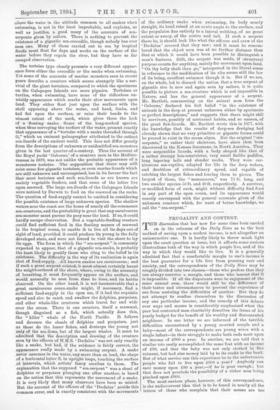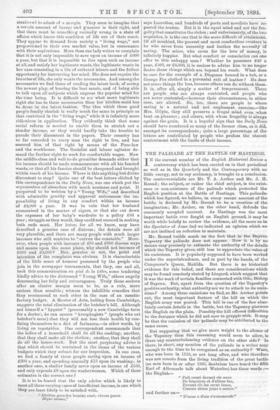FRUGALITY AND CONTENT.
THE discussion that has now for some time been carried on in the columns of the Daily News as to the best method of saving upon a modest income, is not altogether an nninstructive one. It is hardly likely to throw much light upon the exact question at issue, but it affords some curious illustrations both of the way in which people live, and of the way in which they would like to live. It is a generally admitted fact that a comfortable margin to one's income is the best guarantee for a life free from pressing care and anxiety, and the correspondents of the Daily NCU18 may be roughly divided into two classes,—those who profess that they can always contrive a margin, and those who lament that it is impossible. If all the disputants were in enjoyment of the same annual sum, there would still be the difference of their tastes and circumstances to prevent the experience of one from assisting the difficulties of another. But they do not attempt to confine themselves to the discussion of any one particular income, and the comedy of this debate over ways and means is considerably emphasised when the poor but contented man charitably describes the items of his yearly budget for the benefit of his wealthy and discontented neighbour. In one letter we are informed of the terrible difficulties encountered by a young married couple and a baby—most of the correspondents are young wives with a single infant—in their struggle to make both ends meet upon an income of 2800 a year. In another, we are told that a similar trio easily accomplished the same feat with an income of 280, and that the baby was not only clothed in fine raiment, but had also money laid by to its credit in the bank. But of what service can this experience be to the unfortunate people who fail to live upon 2800 a year P Anybody can save money upon 280 a year,—if he is poor enough ; but that does not preclude the possibility of a richer man being pinched upon 2800.
The most curious phase, however, of this correspondence, is the undercurrent idea that is to be found in nearly all the letters of those who complain that their means are too
straiter ed to admit of a margin. They seem to imagine that a cenain amount of luaus' and p'eastire is their right, and that there must be somethisg radically wrong in a state of affairs which leaves this condition of life out of their reach. They appear to demand from society a "living wage," not proportioned to their own market value, but in consonance with their aspirations. More than one lady writes to complain that it is not only impossible to save upon an income of £600 a year, but that it is impossible to live upon such an income at all, and satisfy her legitimate wants, the legitimate wants in her case consisting in a life of cultured leisure and the fullest opportunity for instructing her mind. She does not require the luxuries of life, she only wants the necessaries. And among the necessaries we find those of reading the latest book, of seeing the newest play, of hearing the best music, and of being able to talk upon all subjects which engross the popular mind for the time being. It is difficult to see what more legitimate right she has to these necessaries than her kitchen-maid has to dress in the latest fashion. The idea which these good people fondly cherish is really much the same in principle as that contained in the "living wage," while it is infinitely more ridiculous in application. They evidently think that some social reform is needed to enable them to stretch out a slender income, or they would hardly take the trouble to parade their discontent in the papers. Their country has so far conceded to every man the right to live, and has assured him of that right by means of the Poor-law and the workhouse. The Socialist and labour agitator de- mand the further right to work for comfortable wages. Now the middle-class and well-to-do grumbler demands either that his income should be made commensurate with all his fancied wants, or that all his fancies should be cheapened and brought within reach of his income. Where is this anything but divine discontent to stop P Quite one of the best letters elicited by this correspondence in the Daily News, was one which put the argumentum ad absurdum with ranch neatness and point. It purported to be written by a "Young Wife," and described with admirable gravity and apparent seriousness the im- possibility of living in any comfort within an income of 24,000 a year. It was in vain that her husband economised in the matter of cigars, or that she cut down the expenses of her baby's wardrobe to a paltry £64 a year ; struggle as they would, they could not succeed in making both ends meet. Her letter, for all we know, may have described a genuine case of distress ; the details were all very plausible, and there are many people with much larger incomes who still contrive to "outrun the constable." More- over, when people with incomes of £80 and £800 discuss ways and means upon the same plane, why should not incomes of 2400 and £4,000 P But, genuine or not, the point and intention of the complaint was obvious. It is characteristic of the little sense of humour possessed by the people who join in the newspaper tournaments, that they, one and all, took this communication au pied de la lettre, some tendering kindly advice to the distressed "Young Wife," others angrily denouncing her folly and extravagance. Truly these seekers after an elusive margin seem to be, as a rule, more serious than sensible ; witness the infallible remedies that they recommend to each other in the case of an unsatis- factory budget. A Master of Arts, bailing from Cambridge, suggests the total elimination of the butcher's bill. Although not himself a " hygeist " (presumably a new Cambridge term for a doctor), he can assure " kreopha,gists " (people who eat butcher's meat) that they will not lose their health by con- fining themselves to a diet of farinacea,—in other words, by living on vegetables. One correspondent recommends that the ladies of a household shall do all the cooking; another,
that they shall make all the clothes ; another, that they shall do all the house-work. But the most perplexing advice is that which should be contained in the items of the various budgets which they submit for our inspection. In one case, we find a family of three people saving upon an income of £300 a year, and spending annually £13 upon its washing ; in another case, a similar family saves upon an income of £:550, and only expends £8 upon the washerwoman. Which of these estimates is the correct one P It is to be feared that the only advice which is likely to meet all these varying eases of insufficient income, is one which they are least likely to be satisfied with.
"Divitia3 grandee homini stint, vivere pane &quo aninao," says Lucretius, and hundreds of poets and novelists have re- peated the truism. But it is the equal mind and not the frugality that constitutes the riches ; and unfortunately, of the two requisites, it is the one that is the more difficult of attainment. Of all mankind, the poorest and most comfortless creature is- he who saves from necessity and loathes the necessity a saving. The miser, who saves for the love of money, is infinitely happier. But what comfort or consolation can one offer to this unhappy man P Whether he possesses £40 a year, £100, or £4,000, it is useless to advise him to no longer- desire those things which are beyond his reach. What does he care for the example of a Diogenes housed in a tub, or a George Fox clothed in a perennial suit of leather P He does not crave things the less, because others can do without them. It is, after all, simply a matter of temperament. There are people who are always contented, and people who are never contented,—however their circumstances, in either case, are altered. So, too, there are people to whom saving is a natural and not unpleasant exercise,—like Mrs. Gilpin, they still preserve a frugal mind even when bent on pleasure ; and others, with whom frugality is always against the grain. It is a hopeful sign that the Daily News should have numbered so many of the former class, as it did, amongst its correspondents ; quite a large percentage of the letters are contributed by people who profess the utmost contentment with the limits of their income.







































 Previous page
Previous page